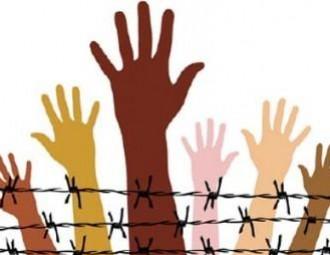Aliaksei Kazliuk: In the sphere of human rights Belarus does nothing but blames other countries

By refusing to cooperate with the special rapporteurs on human rights Belarusan authorities can not improve the situation with the human rights in our country.
Belarusan Foreign Ministry has issued a report “Most Resonant Human Rights Violations in Certain Countries 2013” and presented it on Monday, February 10. At the same time the Foreign Ministry refused to invite to Belarus Miklosh Haraszti,. EuroBelarus Information Service has asked Aliaksei Kazliuk, lawyer and an expert of the Legal Transformation Center “Lawtrend”, to comment on the situation.
- How can you explain the inconsistency in the actions of the Belarusan authorities when they refuse to invite Miklosh Harazsti, special reporter of the United Nations Human Rights Council to Belarus, simultaneously publishing a report on human rights violations in other countries?
- The fact that the Ministry of Foreign Affairs publishes such kind of reports shows that Belarus de-facto recognizes that the problem of human rights is not an internal affair of a country. Thus, Belarus acknowledges the general approach of the UN and the EU that is implemented in the sphere of international law. Although usually our government declares that human rights are often exploited by international organizations and the European Union as a means of political pressure. The existence of the report provides additional arguments for human rights defenders and international organizations in a dialogue with Belarus.
But Belarus does nothing but blames other countries in violating human rights; the process of interaction with international organizations does not advance. Belarus would refuse to cooperate when it concerns the implementation of rights. A good example here is the interaction with the UN special procedures which include country rapporteurs and thematic rapporteurs. The first ones are appointed to countries where there are systematic human rights violations, the number of such countries is 13 including Belarus. The thematic rapporteurs deal not only with human rights, but also with social, economic, cultural and other rights. They work in all countries and provide reports to the Human Rights Council and the UN General Assembly.
Basically, the rapporteurs do not need to ask for a permission to write a report on a particular problem. Countries agree to this procedure on default as members of the UN. Countries also have to communicate with special rapporteurs when they investigate specific cases of human rights violations. The UN special procedures provide that rapporteurs can visit countries to collect the information. The fact that there is a list of special rapporteurs who may be invited to Belarus is a positive sign. It allows us to hope that the situation between Belarus and international organizations in the field of human rights will move from the dead point.
Unfortunately, Belarus did not follow the path of those countries that provide a “permanent invitation” for special rapporteurs. The number of such countries is 108. We tend to invite the rapporteurs who the government consider appropriate to call. For example, in 2009 a rapporteur on combating the trafficking of people was invited to our country. It is not surprising because Belarus can demonstrate great results in this sphere.
- Why does the government continue to claim that it makes no sense to invite Miklosh Haraszti?
- It is all due to the negative experience of cooperation with Adrian Sevyaryn, the former special rapporteur on Belarus. Since then Belarus has negative assessment o the situation with the appointment of a special rapporteur on Belarus, and since then it has not refrained from any contacts and has been opposing to the institution of country rapporteurs. The Belarusan Government believes that there should be only thematic rapporteurs. And even before Miklosh Haraszti was appointed to this post, the official Minsk had declared that they would not work with him.
According to human rights defenders in Belarus our stand is inefficient, because the function of a special rapporteur is to emphasize the human rights problem and inform other UN bodies about it. As a result, when a rapporteur gets the information from human rights defenders and civil organizations and has no possibility to collect the data from the authorities, this information becomes counterproductive for Belarus.
- Does our government need to cooperate with the special rapporteur on Belarus at all?
- Judging by the experience of other countries, we may say that if a country is aimed at improving the situation in a particular sphere, the cooperation with special rapporteurs is a useful tool to achieve their goal. Because the advance of countries is fixed in UN documents which will change the attitude towards a country from the side of international organizations and other countries of the world.
- The Belarusan authorities have not undertaken any evident steps to improve relations with international organizations in matters of human rights. What could they possibly do to move forward?
- The situation with human rights in our country has not changed for ages. The Belarusan government has been ignoring the decisions of the Committee on Human Rights of the UN. It is actually the only international agency where Belarusans may apply if they think that their rights are infringed by the government. First of all, we should not ignore the questions on the topic of human rights from international organizations. There are many different mechanisms that allow countries and organizations interact with the aim of improvement. As far as the UN special procedures are concerned, the attitude of the government is crucially important. It is in our interest to co-work with special rapporteurs: to respond to their requests, invitations and to provide them with information.
-
03.01
-
07.10
-
22.09
-
17.08
-
12.08
-
30.09



























